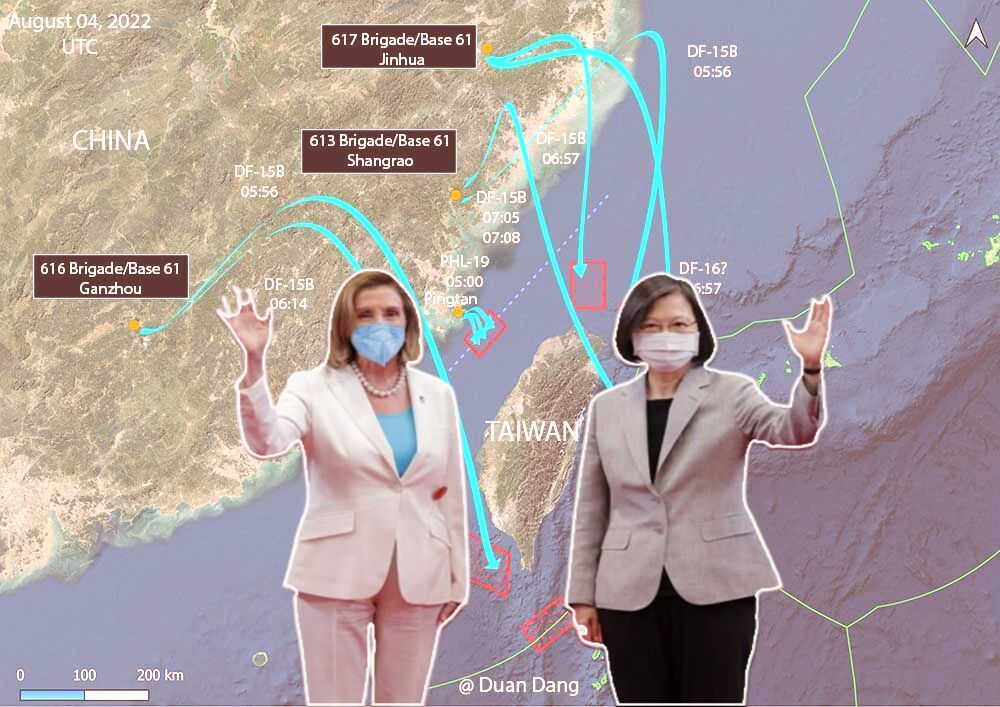
- The Chinese believe in utilising their defence forces as an instrument of strategic deterrence and posturing, which would intimidate its potential enemies.
- China does understand that U.S. Congress is an independent body and is not bound by the advice of even the president of the United States, in taking decisions which is independent of its functioning.
- Taiwan has also activated its military exercises and has kept its defence forces on high alert while the USA in response has activated its military presence in the region by sending in one of its Aircraft Carriers to a Taiwanese naval base.
- Although it’s advisable that India’s foreign and strategic policy should continue the One-China policy, only in order to retain stability in the Indian subcontinent, it must reconsider its stand on Taiwan and establish full-scale diplomatic relations at the appropriate time.
Nancy Patricia Pelosi, the speaker of the US Congress, landed in Taiwan despite the warning signals sent across by the CCP regime. The sudden military escalation by both Taiwan and USA is rising the global strategic temperatures and conflict fears. Although the US government officially believes in the “ One China policy”, its alliance and support to Taiwan have been developed on a strategic front over the years. Several efforts have been made by the US administration to Scrap its One China policy. But its compelling need to maintain a geopolitical balancing act has forced it to retain this policy and develop a counter alliance, not Just with Taiwan, but also with Japan, South East Asian countries and the South Asian countries, as its larger game plan in the Indo Pacific, to contain the rising influence of Chinese hegemony.
The current conflict began when Speaker Nancy Pelosi decided to visit Taiwan last month. A tense phone call took place last week between U.S. President Joe Biden and Chinese Premier XI Jinping, where the controversial visit was discussed in detail. President Biden made it absolutely clear that U.S. Congress is an independent federal body, and its members can take independent decisions. They are not bound by the aid and advice of the White House or the state department. The White House has disassociated Speaker Nancy’s visit to Taiwan claiming it to be an independent decision. It also appears that Miss Pelosi has not consulted the White House or the state department before making such a critical decision that would have a geopolitical impact and pathbreaking geostrategic consequences on US and NATO’s national security agenda.
China believes in the 'Gun Boat diplomacy' strategy, wherein its hard-core military might would be used as a negotiating tactic, with would turn any International deal, treaty or arrangement in its favour.
However, China does understand that U.S. Congress is an independent body and is not bound by the advice of even the president of the United States, in taking decisions which is independent of its functioning, its internal democratic setup and its working mechanism. But as is predicted by most international affairs observers and strategic studies scholars in the USA and the West, China is pretending that this visit has been officially sanctioned by the government of the USA and that its intelligence establishment has sanctioned the escalation of Taiwan’s situation. Military exercises are being carried out by China in its strategically most significant geography which is the South China Sea and the North China Sea by issuing direct threats to Taiwan and its allies. China is indicating a potential confrontation with Taiwan’s military as well as the escalation with NATO forces wherein the obvious target would be aimed at the Americans.
Taiwan has also activated its military exercises and has kept its defence forces on high alert. The USA in response has activated its military presence in the region by sending in one of its Aircraft Carriers to a Taiwanese naval base. But the threats and shockwaves have been felt in most of the countries in South East Asia, East Asia, South Asia and mainly in the Japanese archipelago. There are a lot of talks globally, about the culmination of this conflict which might trigger conventional warfare between NATO and the combined China-Russia alliance as Russia is tacitly aiding China in its aggression against Taiwan. However, this is mostly an unlikely scenario as the Chinese are heavily focused on their economic goals and would not do anything that would hamper their geo-economic predominance. More so, the Chinese believe in utilising their defence forces as an instrument of strategic deterrence and posturing, which would intimidate its potential enemies. China believes in the ‘Gun Boat diplomacy’ strategy, wherein its hard-core military might would be used as a negotiating tactic, with would turn any International deal, treaty or arrangement in its favour.
What should be the Indian response?
Having observed this situation very carefully, India too needs to rethink its one-China policy. It needs to develop a covert economic alliance with Taiwan and increase its economic foothold in Taiwan, by developing successful and successive trade deals. Perhaps if India needs to prove itself to be efficient and effective as an emerging global power, there is a definite need to establish at least a consular relationship with Taiwan. Although it’s advisable that India’s foreign and strategic policy should continue the One-China policy, only in order to retain stability in the Indian subcontinent and the Indian Ocean region at the present, in future, it must reconsider the stand on Taiwan and must establish full-scale diplomatic relations at the appropriate time.
(The author has an MA in International Relations)
Viswapramod is a PhD Scholar at the Department of International Studies and Political Science, Christ University, Bangalore. He has an MA in International Relations. Views expressed are the author’s own.
